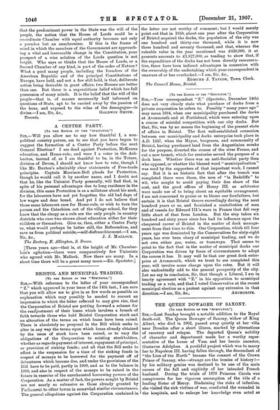BRISTOL AND MUNICIPAL TRADING.
[To THE EDITOR or Tat " detanTOR.1 SIE,"-With reference to the letter of your correspondent " Z." which appeared in your issue of the 14th inst., I am mike That you will allow me to give in as fe* words as possible an explanation which may possibly be needed to correct an impression to which the letter referred to may give rise, that the Corporation of Bristol are putting forward a scheme for the readjustment of their loans which involves a breach of faith towards those who hold Bristol Corporation stock and an alteration of the terms on which loans have been raised. There is absolutely no proposal in the Bill which seeks to alter in any way the terms upon which loans already obtained by the issue of stock have been raised, or to vary the obligaticiiis of the Corporation to existing stockholders, whether as regards payment of interest, repayment of principal, or proVision of sinking funds; and all that the Bill seeks to effect is the suspension for a time of the sinking funds in respect of moneys to be borrowed for the payinent off of debentures which become due, and under the provisions of the Bill have to be paid, partly in 1909, and as to the balance in 1910, and also in respect of the moneys to be raised in the future in exercise of the unexhausted borrowing powers of the Corporation. As a matter of fact, the powers sought by Bristol are not nearly so extensive as those already granted by Parliament to other towns in somewhat similar circumstances. The general allegations against the Corporation contained in
the letter are not worthy of comment; but I would merely point out that in 1850, about one year after the Corporation of Bristol acquired the docks, the population of the city was one hundred and thirty-one thousand, while it is now three hundred and seventy thousand, and that, whereas the rateable value in the year mentioned was £426,000, it at presents amounts to £1,827,000, as tending to show that, if the expenditure of the docks has not been directly remunera- tive, there have been indirect advantages in connexion with the ownership of the undertaking which your correspondent is unaware of or has overlooked.—I am, Sir, &c.,
EDMUND J. TAYLOR, Town Clerk.
The Council House, Bristol.














































 Previous page
Previous page